SUSTAINABILITY MONTHLY MEET UP – TREAT PEOPLE FAIRLY: 9 AUGUST 2022
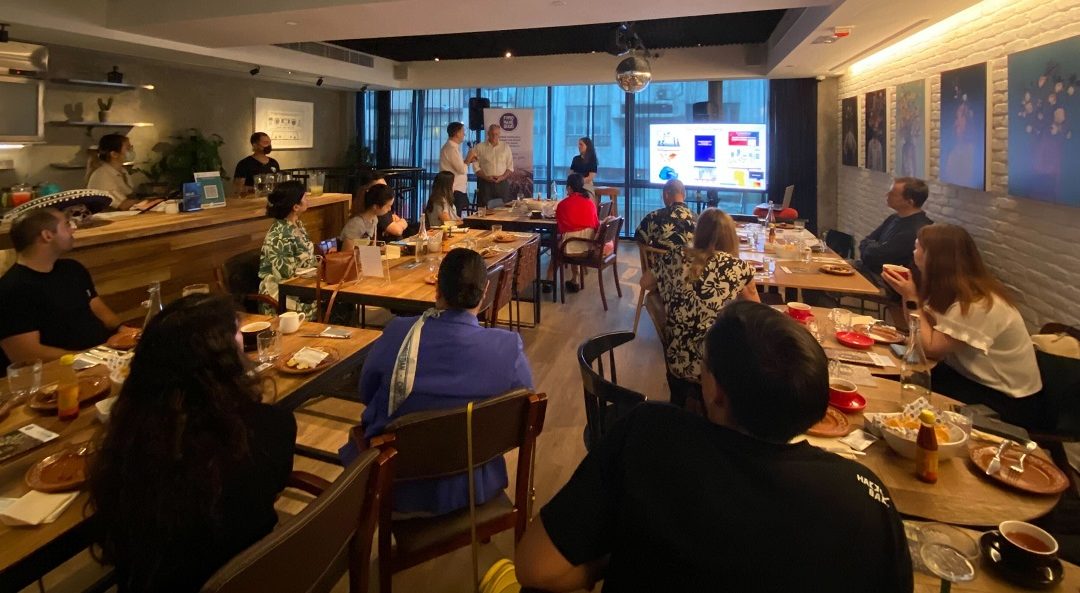
Held at one of our Member’s venues, the vibrant Mexican restaurant & bar, Te Quiero Mucho, our August Sustainability Meet-up dove into one of ten key focus areas in our framework: Treat People Fairly. This important topic aligns with the UN Sustainable Development Goals which include: achieve gender equality and empower all women and girls, reduce inequality within and among countries, end poverty in all its forms everywhere and promote decent work to promote economic growth. Members were updated on the latest risks on anti-slavery and how to spot it.
THE PEOPLE PROBLEM
The People At Work 2022 report highlights how employees over time have changed since the pre-pandemic period. Essential workers carry out an average of two hours more unpaid overtime than the rest of the workforce (9.4 hours versus 7.3 hours) and 67% of employees are experiencing stress at work. Job security, covid lockdowns and overall health fears have led to employees seeing an increase in mental health issues according to 4hoteliers.
In the F&B industry in Hong Kong, the unemployment rate rose to 6.2% from November 2021 – January 2022. The UNDP says ‘Poverty eradication is only possible through stable and well-paid jobs’.
Having a high turnover rate may indicate that the company culture might be toxic, or employees do not feel fulfilled working at the company. The hospitality industry has a high turnover rate of 74%, compared to the average of 15% in other sectors. This is a problem.
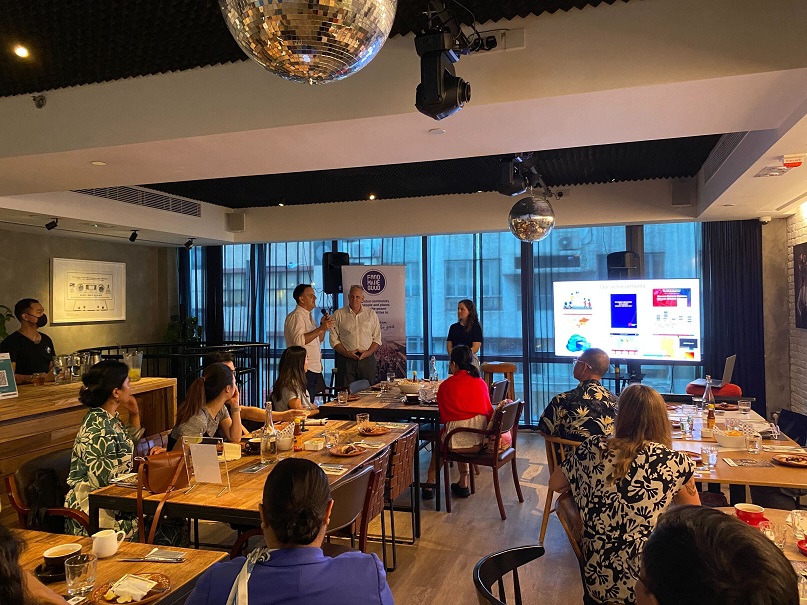
An eye-opening evening at Te Quiero Mucho
HOW CAN WE TACKLE THIS?
By applying Maslow’s Hierarchy of Needs to the workplace, you can increase employee retention by making people feel “financially safe”, followed by delegating meaningful work, applying their personal skills and interests, public and personal recognition, and navigating their journey to becoming proud of the company they work for.
Understanding employee motivation is critical. A person that has just begun their career will be more concerned with physiological needs like earning sufficient pay in the form of stable income and security needs. Once these basic needs are met, the employee will then focus on social needs. From finding the work they do meaningful to feeling appreciated, their pride in the company they work for, will grow.
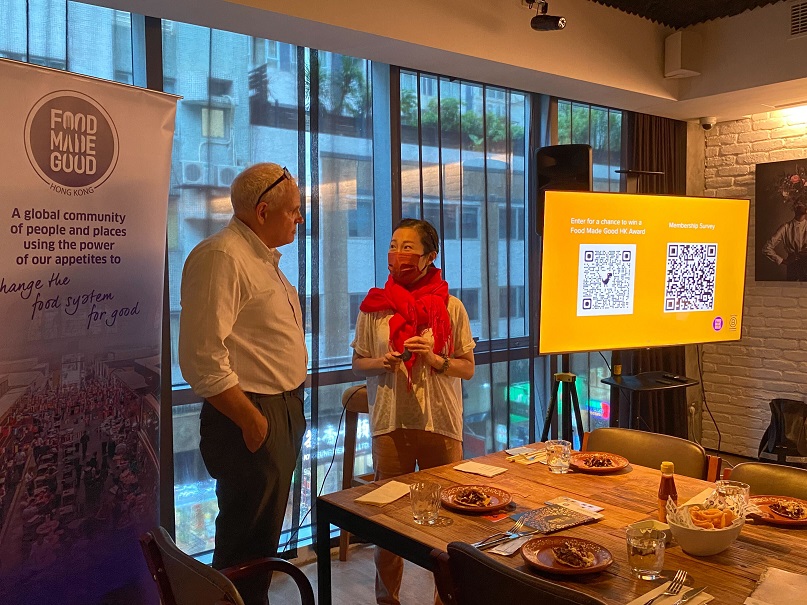
Matt and Sandy from TABLE by Sandy Keung
THE HIDDEN PROBLEM: MODERN SLAVERY
You may ask what modern slavery has to do with the foodservice industry? Along with treating people and staff fairly, we also need to form a long term view – to treat everyone fairly. Addressing modern day slavery issues in the foodservice sector is extremely important especially when we purchase foods such as bananas, cacao, coffee, palm oil, rice and other staple commodities. The procurement and purchases that restaurants and consumers make everyday, may unintentionally support and endorse modern day slavery without the awareness of its potentially unfair practices.
This month’s Sustainability Meet-up speaker welcomed the passionate and experienced Matt Friedman, CEO of Mekong Club who has been working on human trafficking issues for 25 years and has worked with the United Nations. He spoke with us about the shocking statistics of modern day slavery.
Modern slavery not only exists. It is prevalent. 50 million people worldwide have fallen victim to it. “We have more slaves today than any other time in history. 62% are in Asia due to the high population in these countries”. 25,000 people enter per day into modern slavery, every four seconds.
The fishing industry is one example. Modern slaves are used on Thai fishing boats. The journey starts like this. A young boy goes to Thailand looking for a job. Money traffickers befriend him and promise him a good deal to work on a fishing boat for three months. This ‘good’ deal turns into 4 years. He works long hours, 17-18 hours a day. He gets beaten and tortured if he refuses to work. The seafood you buy from supermarkets may come from these conditions.
This is just one example. There are a thousand different variations of modern slavery in the cocoa industry, sugar industry and more. We must build awareness and ensure we source and serve fairly.
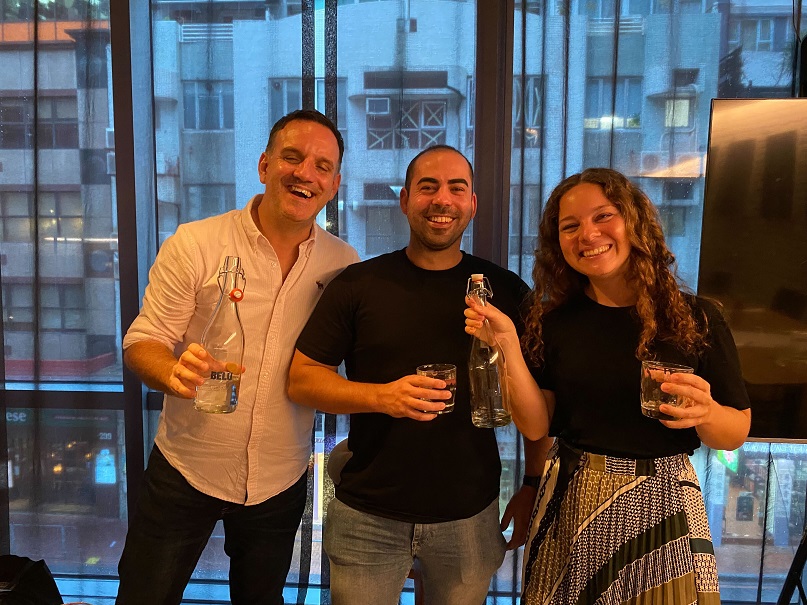
Paul, Yannick & Angelica
WHAT CAN CHEFS AND FOODSERVICE PROVIDERS DO? A STEP TOWARDS A SOLUTION
- Buycott
Support a ‘buycott’. You’ve heard of a boycott. This is when you don’t buy from businesses because they are not transparent about their anti-slavery policy. Instead, a buycott encourages you to buy from organisations that are stepping up and getting involved to address the modern slavery issue.
- Look for suppliers that know for certain that their products do not engage in modern slavery
If you work in the procurement or purchasing department of a company or are someone who purchases ingredients / food from suppliers, you can ask them these questions “Where does your [seafood] come from?” “Is it tainted by modern slavery?” “Do you have systems in place to ensure no modern slavery is associated with your products?” Look for and work only with suppliers that can answer these questions.
- Audit your high risk foods
Look at your entire food supplier list. Identify which foods are most vulnerable to modern slavery. Palm oil and seafood will always be at the top of the list. You can start there. Ask your suppliers the questions above. Make a change if you need to.
- Team up with like-minded restaurants that care about modern slavery
You can team up with other restaurants to send an auditor to do audit checks if you share the same supplier. This is a cost-effective way as you split the costs. Check that your supplier is doing what he’s saying regarding modern slavery. If he passes the checks, support the supplier by sharing this supplier with other restaurants.
- Educate your team
We first need to understand the issue. Leadership within your company should understand that modern slavery is an emerging topic. Assign someone to be a vocal person within the business whose sole job is to look at modern slavery, educate and organise e-learning to share knowledge with team members. Raise awareness.
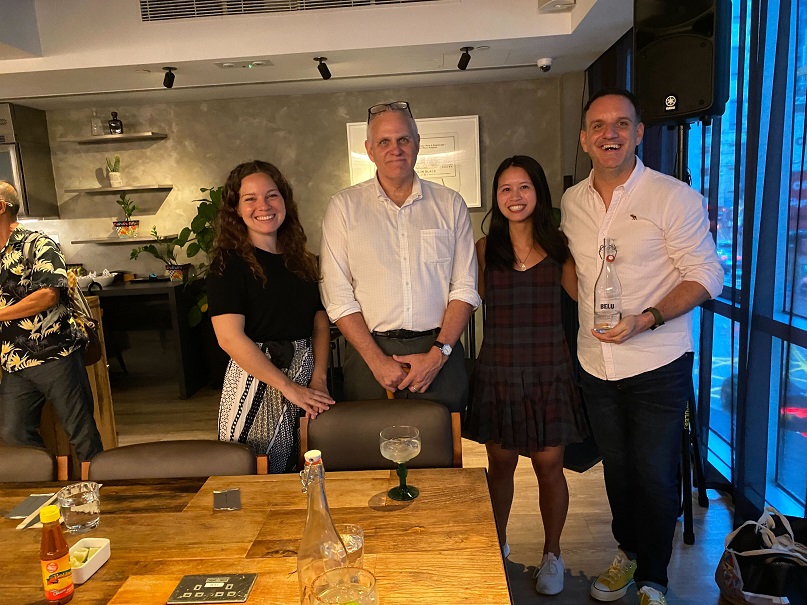
Angelica, Matt, Jessica & Paul
Many of our Members were left inspired and ready to take action after this incredible talk by Matt. Are you interested in educating your teams on modern slavery? Get in touch with Matt at matt.friedman@themekongclub.org and learn more about The Mekong Club.
Meet-ups are a way to educate and inspire! The Sustainability Meet-Up Series is a monthly gathering designed to educate and empower the Hong Kong foodservice community – chefs, restaurateurs, FOH, BOH, suppliers and sustainability leads.
Inspired by our framework, the programme is curated to inspire the community, in novel ways through which they can bring in small but significant changes to their sourcing choices, menu design, supplies, just to name a few. We will be organising talks and activities delivered by sustainable food industry leaders, on various themes linked to UN International Days and our three pillars – Sourcing, Society and the Environment.
A big thank you to our supporter InvestHK, our sponsor Fresh Accounting and kind hosts Te Quiero Mucho for making this event possible.
This content was created prior to our rebranding to Future Green, as of 28/11/22, when we were known as Food Made Good HK.

Interested in more?
2024
We’re Hiring – Marketing Interns Needed!
2024
Reflections from the Future Green Unconference 2.0: A Journey Towards Sustainable Food Systems
2024
SOURCING SEAFOOD RESPONSIBLY IS THE TOPIC OF OUR APRIL 2024 MEMBERS MONTHLY MEETUP
2024
REDUCE, REUSE, AND RECYCLE IS THE TOPIC OF OUR MARCH 2024 MEMBERS MONTHLY MEETUP
2024
PLANT-FORWARD, LESS, AND BETTER MEAT IS THE TOPIC OF OUR FEBRUARY 2024 MEMBERS MONTHLY MEETUP
2024
Marketing Coordinator
2024
The Recycling Crisis: Why Hong Kong Must Prioritise Reducing over Recycling
2024